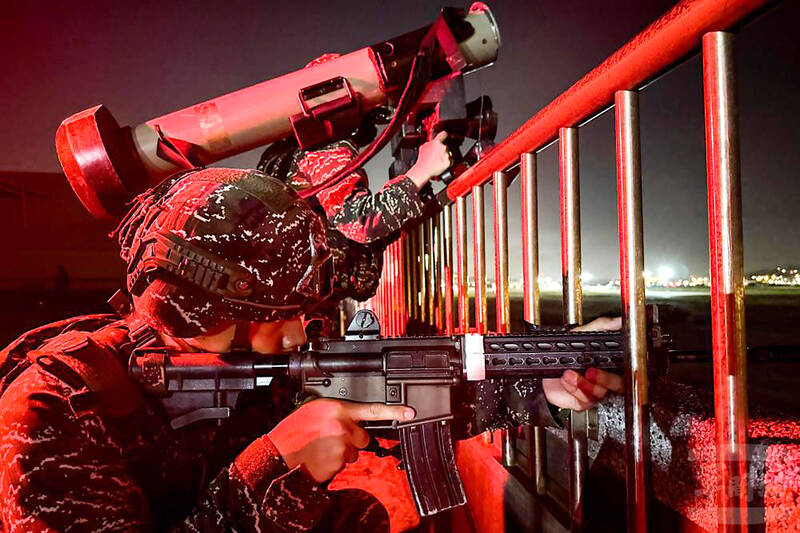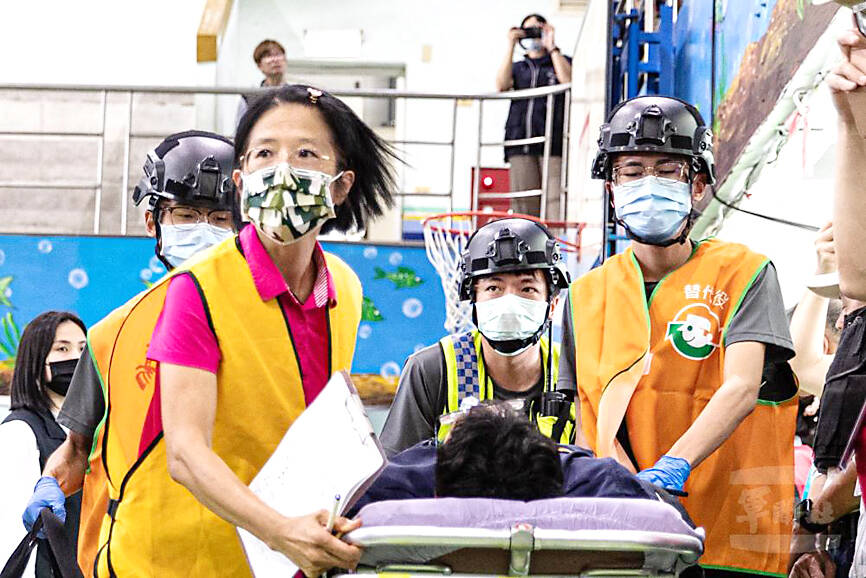The Han Kuang exercises yesterday entered their eighth day with military units throughout the nation and across all services simulating escorting US vessels to Hualien and erecting makeshift defenses.
The ROCS Hsu Hai (旭海) landing dock participated in a simulation of US supply ships being escorted into Taiwanese ports by US carrier groups. It entered the Port of Hualien at 6am, where crew and staff practiced unloading cargo, such as supplies and fuel.
Two Tuo Chiang-class corvettes guarded the port, while the army’s Huadong Defense Command mobilized anti-air units around the harbor.

Photo courtesy of the Military News Agency
The simulation lasted six hours, with the ships departing at noon.
Military officials, speaking on condition of anonymity, said the US could provide support through the Port of Hualien with minimal risk in the event of war.
The 584th Armored Brigade conducted field repair simulations for the army’s CM-11 Brave Tiger main battle tanks at Taoyuan High School, where soldiers were seen operating the M88 recovery vehicle to help remove parts from the tanks to replace cooling fan blades.

Photo courtesy of the Military News Agency
The scenario included armored forces falling back from participating in a beachhead defense for repairs and rest. Stinger missiles carried by special forces featured identification, friend or foe devices to make the simulations as realistic as possible.
On the outlying islands, the Matsu Defense Command’s Beigao Garrison Force conducted drills defending against potential landings on Lienchiang County (Matsu), using CM-21 armored personnel carriers and tactical maneuvers.
Following simulations of defending airports and harbors against landing operations, infantry units in Penghu County practiced makeshift defenses, including setting up barriers and barbed wire in Magong, as well as simulating the evacuation of wounded personnel to the rear.
Minister of National Defense Wellington Koo (顧立雄) visited Hualien to inspect the air force’s simulations of nighttime repairs using foldable fiberglass mats.
M109A5 howitzer artillery from the 586th Armored Brigade conducted nighttime operations on Tuesday night from the military’s Joint Operations Training Base in Pingtung, simulating the launching of suppressive barrages against an enemy.
The Aviation and Special Forces Command joined the simulation yesterday morning, simulating rapid strike deployment capabilities.
The drills were not part of the Han Kuang exercises, which are expected to conclude tomorrow.
Aircraft from the Chinese People’s Liberation Army Air Force entered Taiwan’s southwest air defense identification zone yesterday morning, before being driven away.
Meanwhile, the Urban Resilience Drill is to take place from 1:30pm to 2pm today in northern Taiwan, including Taipei, New Taipei City, Keelung, Taoyuan, Yilan County, and Hsinchu county and city. People are advised to stay indoors during that period, while those who are outside at the time would be required to go to the nearest air-raid shelter or basement.
People who refuse to follow guidance to move indoors face a fine of NT$30,000 to NT$150,000 under the Civil Defense Act (民防法).
Additional reporting by You Tai-lang, Liu Yu-chieh, Aaron Tu, Yu Chao-fu, Liu Yu-ching, Tsai Tsung-hsien and Fang Wei-li

PREPAREDNESS: Given the difficulty of importing ammunition during wartime, the Ministry of National Defense said it would prioritize ‘coproduction’ partnerships A newly formed unit of the Marine Corps tasked with land-based security operations has recently replaced its aging, domestically produced rifles with more advanced, US-made M4A1 rifles, a source said yesterday. The unnamed source familiar with the matter said the First Security Battalion of the Marine Corps’ Air Defense and Base Guard Group has replaced its older T65K2 rifles, which have been in service since the late 1980s, with the newly received M4A1s. The source did not say exactly when the upgrade took place or how many M4A1s were issued to the battalion. The confirmation came after Chinese-language media reported

A Ministry of Foreign Affairs official yesterday said that a delegation that visited China for an APEC meeting did not receive any kind of treatment that downgraded Taiwan’s sovereignty. Department of International Organizations Director-General Jonathan Sun (孫儉元) said that he and a group of ministry officials visited Shenzhen, China, to attend the APEC Informal Senior Officials’ Meeting last month. The trip went “smoothly and safely” for all Taiwanese delegates, as the Chinese side arranged the trip in accordance with long-standing practices, Sun said at the ministry’s weekly briefing. The Taiwanese group did not encounter any political suppression, he said. Sun made the remarks when

The Taiwanese passport ranked 33rd in a global listing of passports by convenience this month, rising three places from last month’s ranking, but matching its position in January last year. The Henley Passport Index, an international ranking of passports by the number of designations its holder can travel to without a visa, showed that the Taiwan passport enables holders to travel to 139 countries and territories without a visa. Singapore’s passport was ranked the most powerful with visa-free access to 192 destinations out of 227, according to the index published on Tuesday by UK-based migration investment consultancy firm Henley and Partners. Japan’s and

BROAD AGREEMENT: The two are nearing a trade deal to reduce Taiwan’s tariff to 15% and a commitment for TSMC to build five more fabs, a ‘New York Times’ report said Taiwan and the US have reached a broad consensus on a trade deal, the Executive Yuan’s Office of Trade Negotiations said yesterday, after a report said that Washington is set to reduce Taiwan’s tariff rate to 15 percent. The New York Times on Monday reported that the two nations are nearing a trade deal to reduce Taiwan’s tariff rate to 15 percent and commit Taiwan Semiconductor Manufacturing Co (TSMC, 台積電) to building at least five more facilities in the US. “The agreement, which has been under negotiation for months, is being legally scrubbed and could be announced this month,” the paper said,